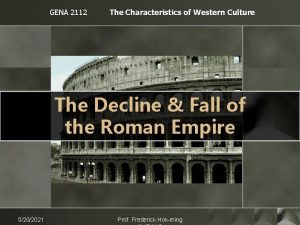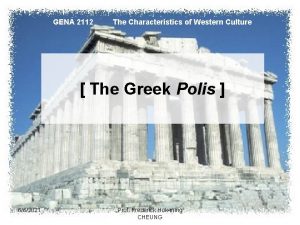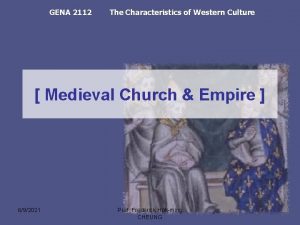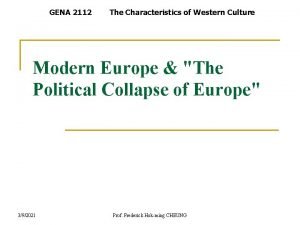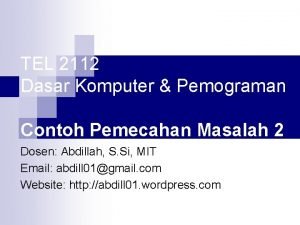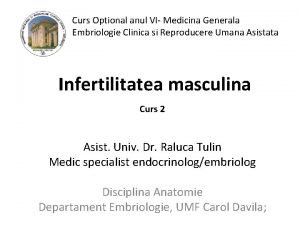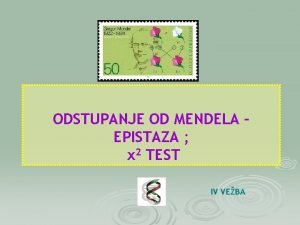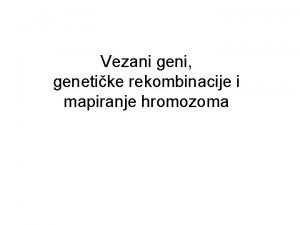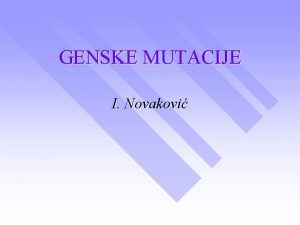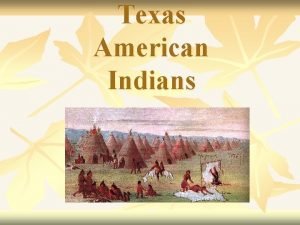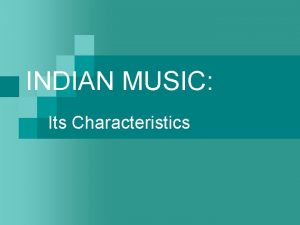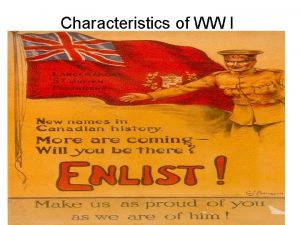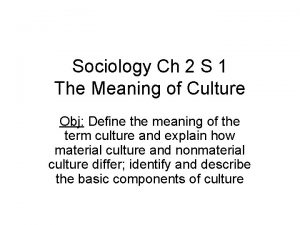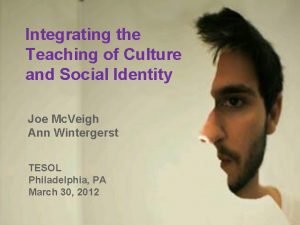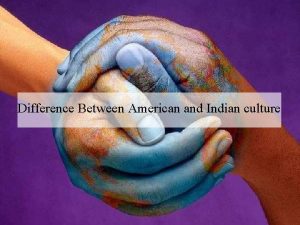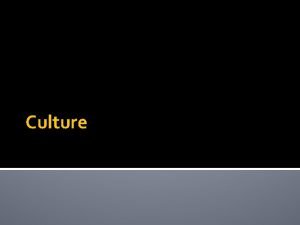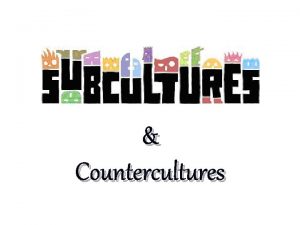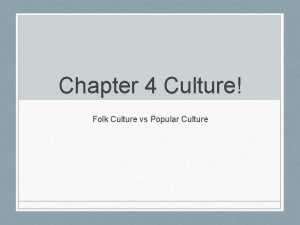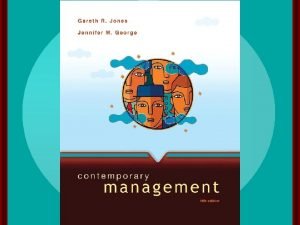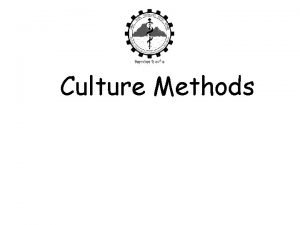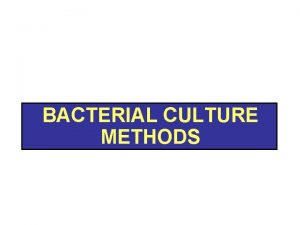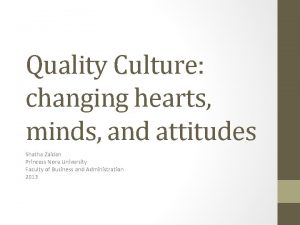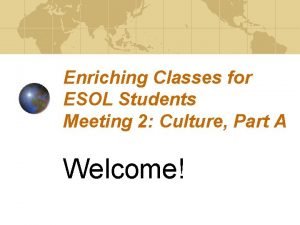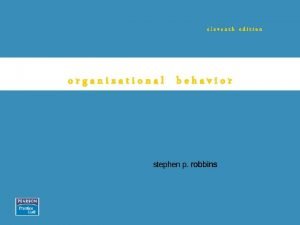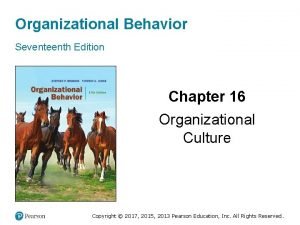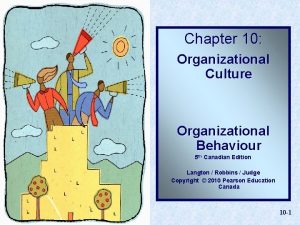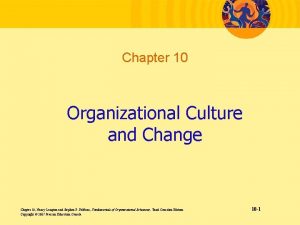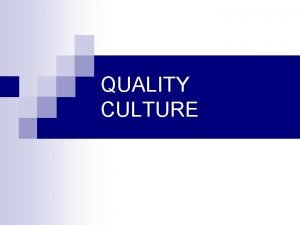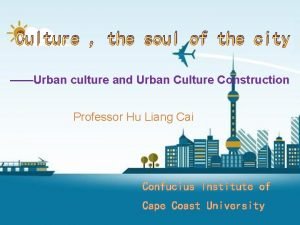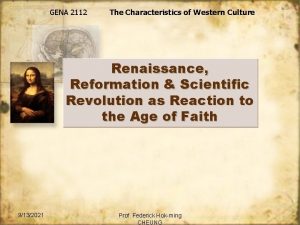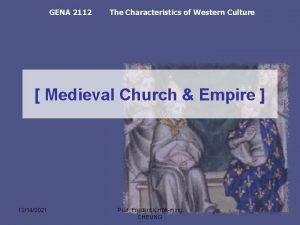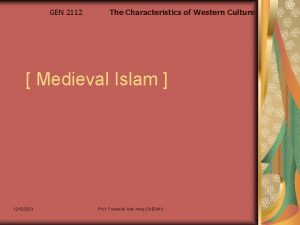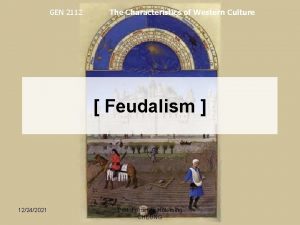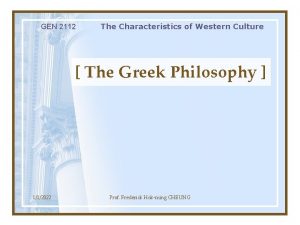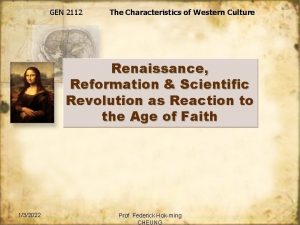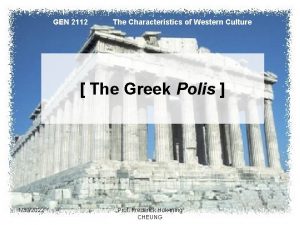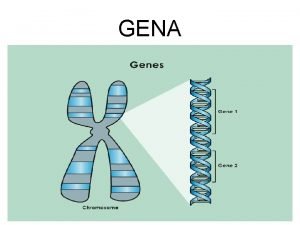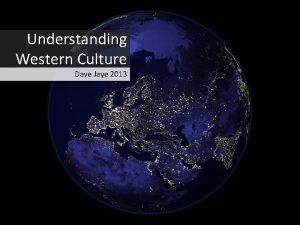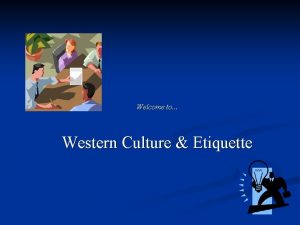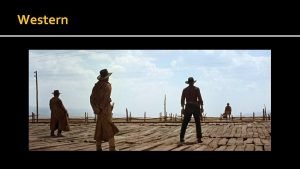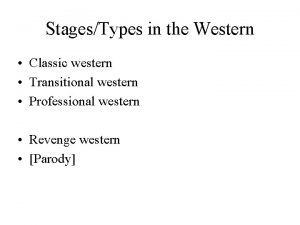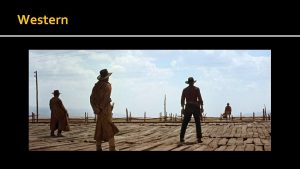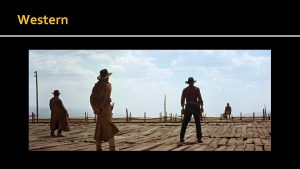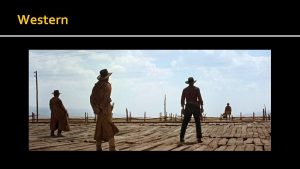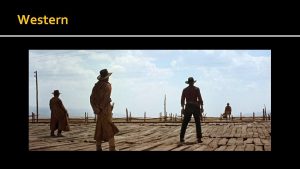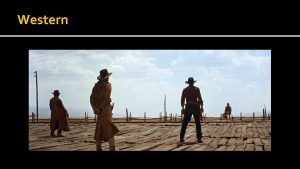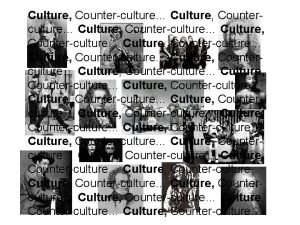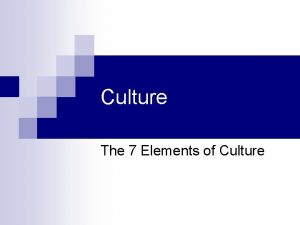GENA 2112 The Characteristics of Western Culture The
![GENA 2112 The Characteristics of Western Culture [ The Greek Philosophy ] 5/25/2021 Prof. GENA 2112 The Characteristics of Western Culture [ The Greek Philosophy ] 5/25/2021 Prof.](https://slidetodoc.com/presentation_image_h2/4c35d03e57c05fc51ff3c693418af493/image-1.jpg)


































![The Republic • (ideal state [utopia] “perfect polis”) • the world of phenomenon is The Republic • (ideal state [utopia] “perfect polis”) • the world of phenomenon is](https://slidetodoc.com/presentation_image_h2/4c35d03e57c05fc51ff3c693418af493/image-36.jpg)





- Slides: 41
![GENA 2112 The Characteristics of Western Culture The Greek Philosophy 5252021 Prof GENA 2112 The Characteristics of Western Culture [ The Greek Philosophy ] 5/25/2021 Prof.](https://slidetodoc.com/presentation_image_h2/4c35d03e57c05fc51ff3c693418af493/image-1.jpg)
GENA 2112 The Characteristics of Western Culture [ The Greek Philosophy ] 5/25/2021 Prof. Frederick Hok-ming CHEUNG

Ancient Greek Philosophy • In ancient Greece (c. 5 th centurt B. C. ) physics and astronomy were included as parts of “philosophy”— “the love of wisdom”. • deals with the universe as a whole • seeks to view the entire universe • seeks to trace everything back to its “ultimate grounds”.

Ancient Greek Philosophy • What is the origin of the universe? • e. g. the science of geometry deals with the law of space, but it takes space for granted (no geometrician asks what space is), BUT, “space” is a problem for philosophy. • e. g. “universe”

Philosophy and the Universe • Philosophy seeks to know why there is a universe at all • e. g. the law of “causation” • everything which has a beginning has a cause • [Plato: “the unmoved mover, the uncaused cause” — the prime mover 原動力] • Therefore, Philosophy deals with the universe as a whole; and it seeks to take nothing for granted

The Earliest Greek Philosophy • The Ionic School • (Thales, Anaximander, & Anaximenes = men of Ionia, coast of Asia Minor) • Thales (c. 624 -550 B. C. ) • founder or father of the Ionic School of philosophy, famous for his mathematical &astronomical learning & for his practical wisdom

Thales’s Philosophy 1. 2. • that the principle of all things is water, that all comes from water, & to water all returns that the earth is a flat disc which floats upon water The significance of Thales is not that this “water” philosophy has any value in itself, but that this was the first recorded attempt to explain the universe on naturalistic and scientific principles (not by myths & Gods).

Thales’s Philosophy • Thales asserted that the ultimate reality is “water” • Later, • Anaximander: “indefinite matter” • Anaximenes: “air” • Pythagoras: “number” • Heracleitus: “fire” • Empedocles: “the 4 elements” (地、水、 火、風) • Democritus: “atoms” • Therefore, this 1 st period (pre-Socratic) • = essentially cosmological in character

Anaximander • Anaximander, c. 611 -547 B. C. • Anaximander agreed with Thales that the ultimate principle of things is material, but he did not name it water. Anaximander believed that it is any particular kind of matter. • “it is rather a formless, indefinite, & absolutely featureless matter in general” • Therefore, a marked advance philosophically showing the operation of thought & abstraction

Anaximenes • Anaximenes (c. 588 -524 B. C. ) • ”Air” is constantly in motion & has the power of motion inherent in it, & this motion brought about the universe from “Air”.

Pythagoras • Pythagoras, (b. 580 B. C. -507 B. C. ) • ”all things are numerable, & can be counted. ” • e. g. in geometry, angles are measured by the number of degrees • Therefore, number is a very vital aspect of the universe & is fundamental in it.

Pythagoras • + opposites of which the universe is composed” Limited Unlimited Odd Even One Many Masculine Feminine Rest Motion

Ancient Greek Philosophers: 2 nd Period • 2 nd period: the sophists & Socrates/ Plato to Aristotle (the maturity of Greek philosophy). • ↓ Socrates/ Plato: • “the problem of the mind & the problem of the nature”

Socrates • Socrates was first interested in natural science: whether the earth is flat or not, etc. but was not satisfied with the result of his research • So, he abandoned the study of natural science and turned to the study of human life • In teaching method, he did not use “spoon-feeding” method, but “dialogue – questions & answers”. Socrates liked using examples of daily affairs to enlighten his students • “educare” (Latin) = to lead

Socrates • born in Athens • ugly • yet, mind = creative, clear, critical, eager • Socrates divine mission: • “was to expose the ignorance of those who thought themselves wise” • *What Socrates really knows? • “Socrates does not claim to know anything. ”

Socrates • “Socrates did not think he knew a lot. ” Yet, Delphi’s Oracle: “no one is wiser than Socrates” • Therefore, Socrates knew that he was ignorant (but the others did not know that we were ignorant) • Compare with Confucius

Socrates • Socrates belittled his own knowledge • really honest thinkers are seldom impressed by their own ability • the companies by whom Socrates was constantly surrounded were not so much as disciples but were as friends who loved him and drew inspiration from him.

Logical thinking • Students like to presume that there must be an absolute answer to all questions. Actually, NO! • • By systematic question: What (define) Where When Why How (adduction 引證法) via dialogues 「問答對話」in careful definition & logical thinking • ”The greatest power on earth is the power of reflection”(反省)

Socrates on Trial • 399 B. C. ↗Meletus, • 3 Athenian citizens →Anytus, ↘Lycon • accused Socrates of 1. “heresy” (“impiety”) 2. did not believe/ or observe the gods of the polis 3. “corrupted the minds of the youth” 「腐化青年的心智」

Socrates & Plato • • • c. 582 -507 B. C. Pythagoras 490 -480 B. C. Persian Wars 477 B. C. Delian League *469 -399 B. C. Socrates c. 460 -429 B. C. Era of Pericles 454 B. C. Delian treasury moved to Athens • 431 -404 B. C. Peloponnesian War % Sparta & Athens • *427 -347 B. C. Plato • 384 -322 B. C. Aristotle

Plato • Plato, The Last Days of Socrates (penguin) • ____, The Republic (Penguin) • Karl Popper, The Open Society and its Enemies • Vol. I: The Spell of Plato • 侯健譯《柏拉圖理想國》 • 鄺健行「格列頓」《中國學人》 3(1971. 6)

Plato • • Plato (427 -347 B. C. ) b. in Athens noble birth, yet, his youth saw the decline & fall of power • (404 B. C. Sparta defeated Athens) • + 399 B. C.

Plato • Plato saw his teacher & friend: • Socrates died according to Athens law • = the polis ( Athens democracy, executed his master ∴ final disillusionment — travels) • 386 B. C. Plato returned to Athens, & founded the “Academy” where he taught for the rest of his life (d. 347 B. C. ) • Plato used the dialogue form of writing as the most effective means of presenting his philosophical views.

Plato 1. 2. 3. 4. it was not his intention to answer specific question or to propose final & dogmatic solutions to any of the problem that were being discussed Plato preferred instead to do something that would stimulate original thinking on the part of the reader. this manner of presentation enabled him to present contrasting points of views as they would likely to occur in a series of conversations taking place among individuals having different points of views. Finally, by using conversational method, it would be possible to illustrate the way in which current issues of the day were related to one another.

Plato • This is one of the reasons why no one of Plato’s dialogues is devoted exclusively to the discussion of a single topic. Plato wanted to make it clear that in order to understand any particular subject, you must see how it is related to other subjects and to the field of knowledge as a whole.

Plato’s Republic • theory of government • It represents what Plato regarded as the ideal toward which actual states should strive. • (In a later & considerably longer dialogue called The Laws, Plato proposed a less idealistic but more practical alternative for the organization of state government). • • Timarchy (Sparta) Oligarchy Democracy (Athens) Tyranny

Timarchy • Timarchy【� 榮譽政體� ?】 • Example: Sparta

Oligarchy • Oligarchy � 寡頭政體�

Tyranny • Tyranny (暴君/僭主政體)

Democracy • Democracy (民主政體) • Plato:control by the ignorant majority • No order/discipline • Political struggle, disorder, wars

Plato, The Republic • • • (至善)perfect polis →wisdom →benevolence →bravery →to curb desires • 1. • 2. • 3. Rulers (gold) Auxiliaries (silver) citizen (iron)

Plato, The Republic 1. The Ideal Ruler: • To search for ideal, truth & perfection • soul > body • “philosopher” --- king • Plato believed that only those persons who possessed intellectual as well as moral qualities should be entrusted with the power to ruler over others

Plato, The Republic 2. Auxiliaries • Bravery; • Obedient to the philosopher – King; • Warrior • Little desire

Plato, The Republic 3. • • • Citizens (farmers & workers) A lot of desires Duty = to obey = to produce accordingly

Plato, The Republic 1. Rulers = gold 2. Auxiliaries = silver 3. Citizen = (iron) • Each should behave “accordingly”

Plato |Athens| Democracy |Sparta| Timarchy ×Selfish individualism, ×civic irresponsibility ∴diversity ↓ ×disintegrating ×No individualism ×Growing dislike of authority ×No respect for authority Respect for law Discipline ×Class war % rich & poor (“have” & “have not”) ×Exploitation of the lower class ×Lack of cohesion courage ×Intellectual Limitation
![The Republic ideal state utopia perfect polis the world of phenomenon is The Republic • (ideal state [utopia] “perfect polis”) • the world of phenomenon is](https://slidetodoc.com/presentation_image_h2/4c35d03e57c05fc51ff3c693418af493/image-36.jpg)
The Republic • (ideal state [utopia] “perfect polis”) • the world of phenomenon is not the real world BUT pale, imperfect reflections of ideal models.

The Republic • • VII: “The Allegory of the Cave” Cave --- shadows Philosopher --- sense of duty “Objects that we perceive through our senses are merely pale, imperfect reflections of ideal models that exist in a world invisible to us. ” • • ∴Reality – not by observing experiments, etc. (Aristotle’s science) – - BUT by thinking & contemplating

Books influenced by The Republic • Plato, The Republic ↓ • St. Augustine, City of God ↓ • Thomas More, 1478 -1535, Utopia ↓ • Francis Bacon, The New Atlantis ↓ • James Hilton, The Lost Horizon

<=> literature Criticizing Utopia: • Aristophanes, Birds • Jonathan Swift, Gulliver’s Travels • Aldous Huxley, Brave New World • George Orwell, 1984

Plato • Plato:”If you don’t know that you are ignorant, you are really ignorant” • Plato loved & respected Socrates, his teacher & friend. • In his later years, Plato is reported to have said, “I thank God that I was born Greek and not barbarian, free and not slave, male and not female, but above all that I was born in the age of Socrates. ”

Plato • • • Plato:”questions & answers are still valid today = “The Prince of Philosophy” Because, 1. 2. • • Plato asked many of the fundamental philosophical questions that philosophers still ask today Many of Plato’s answers have been continuously meaningful, & are still meaningful for us today Whitehead (20 th century Philosopher) “modern Western philosophy is only footnotes to Plato”
 Gena 2112
Gena 2112 Gena 2112
Gena 2112 Gena2112
Gena2112 Gena 2112
Gena 2112 Gena 2112
Gena 2112 Data integer adalah
Data integer adalah Kodominantnost
Kodominantnost Cristina gena
Cristina gena Azoospermie nonobstructiva
Azoospermie nonobstructiva Epistaza gena
Epistaza gena Krosing over
Krosing over Genokopija
Genokopija Western gulf culture
Western gulf culture Gulf culture
Gulf culture Characteristics of western genre
Characteristics of western genre Indian music characteristics
Indian music characteristics Communication trenches
Communication trenches Material and non material culture examples
Material and non material culture examples Sociologists define a symbol as
Sociologists define a symbol as Batch culture vs continuous culture
Batch culture vs continuous culture Fed-batch
Fed-batch Individualistic culture definition
Individualistic culture definition American culture vs indian culture
American culture vs indian culture Stab and stroke culture
Stab and stroke culture Folk culture and popular culture venn diagram
Folk culture and popular culture venn diagram Sub culture vs counter culture
Sub culture vs counter culture Folk cultures are spread primarily by
Folk cultures are spread primarily by Tsi
Tsi Folk culture and popular culture venn diagram
Folk culture and popular culture venn diagram In an inert organizational culture,
In an inert organizational culture, Stroke culture method
Stroke culture method Lawn culture
Lawn culture Quality culture vs traditional culture
Quality culture vs traditional culture Surface culture deep culture and esol
Surface culture deep culture and esol Creating a customer responsive culture
Creating a customer responsive culture Organizational cultures often reflect national culture.
Organizational cultures often reflect national culture. Characteristics of organizational culture
Characteristics of organizational culture Characteristics of organizational culture
Characteristics of organizational culture Quality culture definition
Quality culture definition Urban culture meaning
Urban culture meaning Hình ảnh bộ gõ cơ thể búng tay
Hình ảnh bộ gõ cơ thể búng tay
